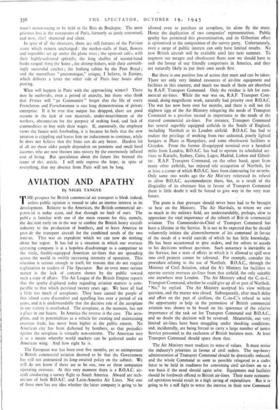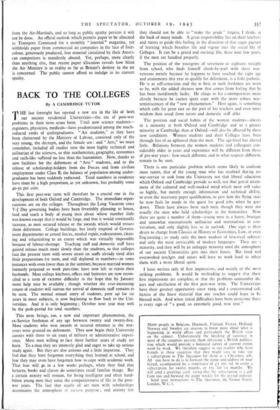AVIATION AND APATHY
By NIGEL TANGYE
THE prospect for British commercial air transport is bleak indeed, unless public opinion is roused to take an intense interest in its development. Relative to the American, the British commercial air- potenial is today scant, and that through no fault of ours. The publ c is familiar with one of the main reasons for this, namely, the dec:sion early on in the war to confine the British heavy aircraft industry to the production of bombers, and to leave America to prov de the transport aircraft for the combined needs of the two nations. This was an expedient which we can now do nothing about but regret. It has led to a situation in which our overseas operating company is at a hopeless disadvantage as a competitor to the virile, freshly-equipped American air-lines that are spreading across the world in swiftly increasing intensity of operation. This situation is serious enough in itself, for reasons that do not require eAplanation to readers of The Spectator. But an even more serious matter is the lack of concern shown by the public toward such a state of affairs. The Air League of the British Empire reports that the apathy displayed today regarding aviation matters is com- parable to that which persisted twenty years ago. We have all had a little too much of aeroplanes. They have caused the people of this island acute discomfort and appalling loss over a period of six years, and it is understandable that the decisive role of the aeroplane in our victory is overlooked. The aeroplane, at the moment, has not a place in our hearts. In America the reverse is the case. The aero- plane, and its potentialities as a vehicle for creating and maintaining overseas trade, has never been higher in the public esteem. No American city has been darkened by bombers, so that prejudice against the aeroplane is virtually non-existent. The American sees it as a means whereby world markets can be gathered under an American wing. And how right he is.
The European war has been over five months, yet so unimportant is British commercial aviation deemed to be that the Government has still not announced its long-awaited policy on the subject. We still do not know if there are to be one, two or three companies operating overseas. At this very moment there is a B.O.A.C. air- craft conducting a survey flight to South America. Aboard are tech- nicians of both B.O.A.C. and Latin-America Air Lines. Not one of those men has any idea whether the latter company is going to be
allowed even to purchase an aeroplane, let alone fly the route. Hence the duplication of two companies' representatives. Public apathy has permitted this procrastination, and its Gilbertian effect is epitomised in the composition of the survey party. Unfortunately, even a surge of public interest can only have limited results. No new British aircraft will be available until late next summer. To augment our meagre and obsolescent fleets now we should have to seek the favour of our friendly competitors in America, and they are naturally likely to put their own needs first.
But there is one positive line of action that must and can be taken. There are only very limited resources of air-line equipment and facilities in this country, and much too much of them are absorbed by R.A.F. Transport Command. Only the residue is left for com- mercial air-lines. While the war was on, R.A.F. Transport Com- mand, doing magnificent work, naturally had priority over B.O.A.C. The war has now been over for months, and there is still not the slightest sign of the Air Ministry relegating the needs of Transport Command to a position second in importance to the needs of the starved commercial air-lines. For instance, Transport Command has several superbly equipped airfields in the South of England, including Northolt as its London airfield. B.O.A.C. has had to endure the privilege of working from two unheated, poorly lighted hangars at Hum in Hampshire, and some obsolescent facilities at Croydon. From the former ill-equipped terminal over a hundred miles from London, B.O.A.C. has had to operate its scheduled ser- vices to Karachi, Sydney, Cairo, Lagos, Madrid, Lisbon and Gibral- tar. R.A.F. Transport Command, on the other hand, apart from many other airfields, has enjoyed sole occupation of Northolt, for at least a corner of which B.O.A.C. have been clamouring for months. Only some two weeks ago the Air Ministry reiterated its refusal to allow B.O.A.C. accommodation there, but, as a result of the illogicality of its obstinate bias in favour of Transport Command there is little doubt it will be forced to give way in the very near future.
The point is that pressure should never have had to be 'brought to bear on the Ministry. The Air Marshals, to whom we owe so much in the military field, are understandably, perhaps, slow to appreciate the vital importance of the rebirth of Briesh commercial aviation. The Commander-in-Chief of Transport Command has been a lifetime in the Service. It is not to be expected that he should voluntarily initiate the dismemberment of his command in favour of the needs of a world outside of which he has little knowledge. He has been accustomed to give orders, and for others to accede to his decisions without question. Such autocracy is inevitable in the Service, but a state of affairs in which it is allowed to spill over into civil projects cannot be tolerated. For example, consider the procedure relating to the use of Northolt. B.O.A.C., through the Minister of Civil Aviation, asked the A'r Ministry for facilities to operate certain overseas air-lines from that airfield, the only suitable one anywhere near London. The Air Ministry asked the C.-in-C., Transport Command, whether he could give up all or part of Northolt. "No," he replied. The Air Ministry accepted his view without question, and the matter was closed. Subsequently, after much delay and effort on the part of civilians, the C.-in-C.'s refusal to seize the opportunity to help in the promotion of British commercial aviation was shown to be based on his ignorance of the relative importance of the task set for Transport Command and B.O.A.C., and no doubt the decision will be reversed. Meanwhile, our very limited air-lines have been struggling under shocking conditions, and, incidentally, are being forced to carry a large number of junior Service personnel to the exclusion of British business men. At least Transport Command should spare them that.
The Air Ministry must readjust its sense of values. It must revise the industry's priorities in favour of civil orders. The top-heavy administration of Transport Command should be drastically reduced, and the whole Command as soon as possible relegated to a cadre force to be held in readiness for converting civil air-lines on to a war basis if the need should again arise. Equipment and facilities should be forthwith Offered to British air-lines. Their more economi- cal operation would result in a high saving of expenditure. But it is going to be a stiff fight to wrest the interest in their new Command from the Air-Marshals, and so long as public apathy persists it will not be done. An official outlook which permits paper to be allocated to Transport Command for a monthly "internal" magazine, yet withholds paper from commercial air companies in the face of four- colour, generously produced, free material circulated by their Ameri- can competitors is manifestly absurd. Yet, perhaps, more clearly than anything else, that recent paper allocation reveals how blind the Air Ministry is to reality so far as Britain's destiny in the air is concerned. The public cannot afford to indulge in its current apathy.



























 Previous page
Previous page